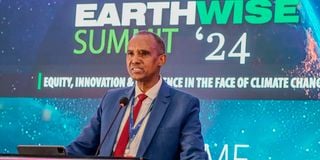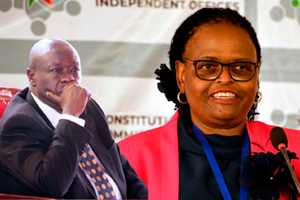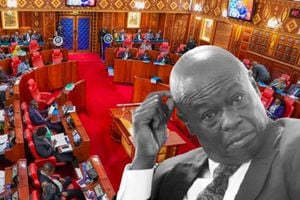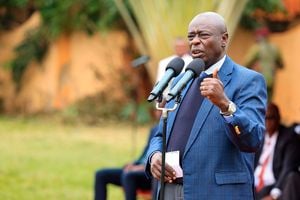Africa’s pain points during upcoming global climate meeting

African Group of Negotiators Chairman Ali Mohammed addressing participants during the Earthwise Summit '24 at KWS Club House in Nairobi on October 03,2024.
What you need to know:
- Africa's leadership for COP29 is spearheaded by President William Ruto, who chairs the Committee of African Heads of State and Government.
As the world gears up for the United Nation's 29th annual climate conference (COP29) in Baku, Azerbaijan, here in Kenya, the second edition of the climate-focused Earthwise Summit, organised by Nation Media Group, took place last week.
During the summit, the Climate Action team spoke to Ali Mohamed, chairman of the African Group of Negotiators and Kenya’s climate envoy, about Africa’s leadership at the upcoming global conference, where he provided insights into the continent's strategic approach and ambitions.
What specific initiatives or proposals will the African Group of Negotiators present at COP29 to address the continent's unique challenges?
Africa's leadership for COP29 is spearheaded by President William Ruto, who chairs the Committee of African Heads of State and Government. The first two days of COP, November 12 and 13, will feature a summit of world leaders to set the conference's direction. At the negotiation level, I have the privilege of leading the negotiators, and our primary focus will be on climate finance. For Africa, accessing adequate, sustainable, scalable, and long-term financing is crucial for adapting to the worsening impacts of climate change and developing low-carbon, climate-resilient pathways. Our target is to secure $1.3 trillion based on studies from the United Nations Framework Convention on Climate Change’s (UNFCCC) Standing Committee on Climate Finance, an independent panel established during COP28, and the UN Economic Commission for Africa, among others. Given the scale of the climate challenges we face, this funding is vital, particularly for adaptation.
How do you plan to engage with developed countries to secure adequate climate financing and technology transfer for Africa?
Africa will maintain engagement with our partners in developed countries and other developing nations. Effective climate action requires collaboration across all levels, but those most responsible for global emissions must take greater action and leadership. Our engagement with developed nations is crucial in negotiations across various platforms, including the General Assembly and COP discussions.
In what ways can regional cooperation among African nations enhance the continent’s negotiating power at COP29?
The African Group of Climate Change Negotiators, which I have the honour to lead, consists of experts who have long been involved in these discussions. Their knowledge and experience will enable us to proactively engage with other negotiating groups and advocate for our continent's priorities.
How do you envision addressing climate justice to ensure Africa’s voice is heard in discussions often dominated by larger economies?
Africa, comprising 54 countries as parties to the UNFCCC, is the largest negotiating block, which amplifies our voice. Our leadership also emphasises unity, ensuring that the African perspective is heard. However, it's not just about being loud; our voice must be objective and collaborative. This means that we must partner with other regions and engage constructively to achieve our desired outcomes in international negotiations.
What mechanisms are necessary to ensure that agreements made at COP29 are effectively implemented in African countries?
Last year, African governments committed to the Nairobi Declaration, adopted at the African Union Assembly in February, which clearly outlines necessary policy changes and regulations to address climate change. Many African countries, including Kenya, are already enacting effective climate change legislation. For instance, Kenya revised its Climate Change Act last year and recently passed regulations related to carbon markets. This legislative progress indicates that Africa is committed to tackling climate change through policy action.
How should African nations prioritise adaptation and mitigation strategies in their climate policies, and what guidance can you offer on finding that balance?
The Nairobi Declaration reflects Africa's commitment to a climate-positive growth agenda. It highlights our readiness to develop along a low-carbon, climate-resilient trajectory while also assisting the world in decarbonisation - reducing the greenhouse gas emissions produced by the combustion of fossil fuels. This high-level commitment informs the policies and legislation that African governments are implementing.
What is your long-term vision for Africa’s role in the global climate movement beyond COP29?
Today, we convened a diverse group—including public, private and civil society stakeholders—at the initiative of the Nation Media Group to discuss the urgent issue of climate resilience and equity. This collective engagement reflects Africa's future, where all voices, young and old, contribute to shaping our destiny.
Concerns have arisen about Africa being unfairly treated in the transition to green energy. This is a continent that has contributed the least to global emissions, yet it suffers the most from the impacts of climate change. At the same time, Africa is being asked to transition from the very energy sources that fuelled the development of the industrialised world. Will this issue be addressed by negotiators at the upcoming COP?
At COP28, the global community agreed to transition from fossil fuels in a just and equitable manner while aiming to triple renewable energy capacity and double energy efficiency. However, with about 600 million people in Africa lacking electricity and 970 million without access to clean cooking, transitioning to renewable energy is critical for us. Despite having the potential for the best renewable energy sources, Africa received less than three per cent of the $1.8 trillion investment in energy transition last year. This inequity highlights the need to address the perceived risks associated with investing in Africa. As negotiators, we are committed to advocating for a fairer global financial system that supports our growth potential, both at COP and in other forums.





